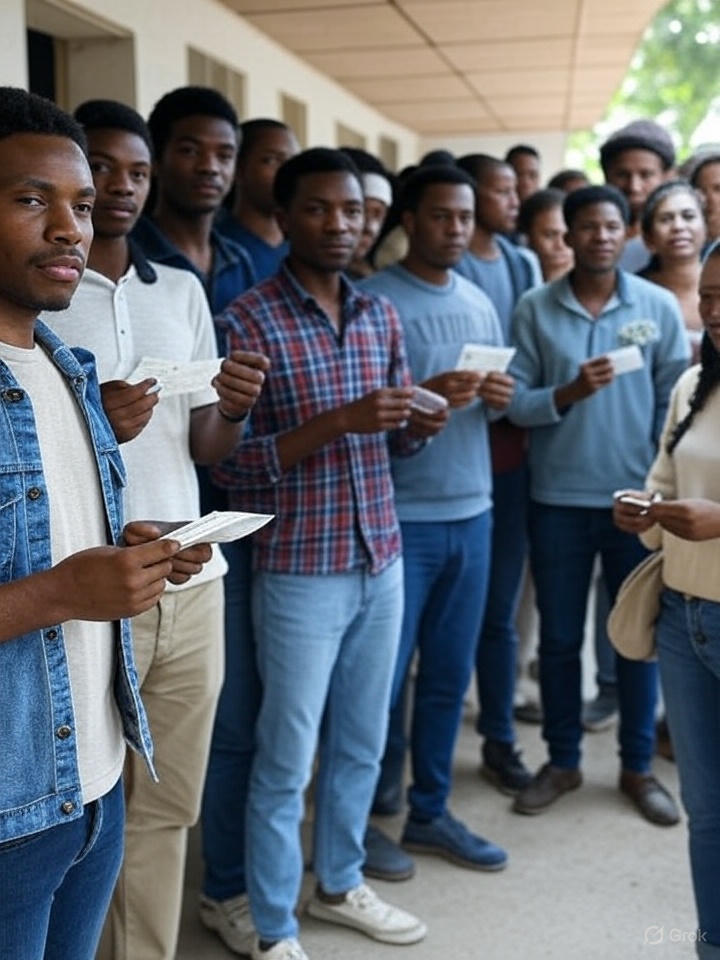
Daniel Otera
Nigeria’s youths are stepping up to influence the nation’s democratic future, as thousands of young people quickly flocked to the newly launched online voter registration portal, signaling a new era of civic engagement.
The Independent National Electoral Commission (INEC) kicked off its Continuous Voter Registration (CVR) exercise with impressive success. Within just seven hours of the portal’s launch, 69,376 Nigerians had completed their online pre-registration. This surge highlights how technology is making it easier for youth to engage in the electoral process amidst Nigeria’s growing population and changing political landscape. According to a press release from INEC, signed by National Commissioner Sam Olumekun, the portal went live at 8:30 a.m., and by 3:30 p.m., the number of online registrations had reached 69,376 (INEC, 2023).
“The registration portal went live at 8:30 a.m., and by 3:30 p.m. that same day, 69,376 Nigerians had pre-registered online,” Olumekun reported.
The data revealed a near-even gender split, with 33,803 males (48.7%) and 35,573 females (51.3%) completing the process. However, the most notable trend is the dominance of younger registrants: 48,033, or 69.2%, were between the ages of 18 and 34. This aligns with Nigeria’s demographic reality, where young people represent a substantial portion of the population. According to Worldometer (2025), Nigeria’s population is expected to reach approximately 237.5 million by 2025, making it the most populous country in Africa and the sixth-largest in the world. With a median age of 18.1 years (Worldometer, 2025), Nigeria’s youth continue to shape the nation’s social and political dynamics. As they constitute a significant portion of the electorate, their growing participation in the electoral process is an essential trend in understanding Nigeria’s political future.
Reports from the National Bureau of Statistics (2022) show that youth aged 15 to 35 represent a large portion of Nigeria’s population. Earlier reports, such as the 2006 National Baseline Youth Survey, suggested that individuals under 35 represented about 60% of the population (National Bureau of Statistics, 2022). This group has the potential to drive political change, as they increase their participation in the electoral process.
INEC’s expansion of the CVR initiative comes at a critical time. The data shows a dramatic increase in voter registration numbers over the years, from about 57 million in 1999 to an all-time high of 93.4 million ahead of the 2023 general elections (INEC, 2023). This increase in voter registration signals growing engagement, particularly among the youth.
However, the 2023 elections saw a disappointing voter turnout of about 26.7%, with only 24.9 million votes cast out of the registered voters (Stears, 2023). Experts attribute this to logistical challenges, mistrust in the system, and voter apathy. Yet, the current digital focus could help reverse this trend by making it easier for first-time voters to participate.
Olumekun emphasized the portal’s accessibility, stating, “The portal is available 24/7 at https://cvr.inecnigeria.org.” This round-the-clock availability is part of INEC’s strategy to integrate both online and offline methods, catering to Nigeria’s diverse needs, where internet penetration has surpassed 50%, according to World Bank figures, although rural areas still lag.
Alongside the online registration, INEC plans to roll out in-person registration starting Monday, 25 August 2025, at 811 state and local government offices across the country. This service will be available weekdays, from 9:00 a.m. to 3:00 p.m., for those who prefer face-to-face interactions or wish to complete their online pre-registrations.
“Meanwhile, the commission will begin in-person registration on Monday, 25th August 2025, at our 811 State and Local Government offices nationwide from 9:00 a.m. – 3:00 p.m. during weekdays (Monday to Friday) only,” Olumekun explained. “This will allow those who prefer the in-person option to register and for the online pre-registrants to complete their registration.”
In a bid to maintain transparency, INEC has committed to providing weekly updates on CVR progress, broken down by state, gender, age, occupation, and disability status. This level of detail ensures inclusivity across Nigeria’s diverse regions.
“Voter registration is only open to Nigerian citizens aged 18 or older who are not already registered,” Olumekun reminded the public. “Double or multiple registrations are a violation of the law. However, inter-state/FCT and intra-state/FCT voter transfers and the replacement of lost or damaged voter cards are allowed during the CVR.”
The CVR exercise, as mandated by the 2010 Electoral Act (as amended), ensures that the voter register remains accurate and up-to-date. This process is vital for conducting free and fair elections, reducing the likelihood of disputes on polling day (INEC, 2023).
Leading up to the 2023 elections, nearly 12.5 million new voters were registered, driven in large part by the online registration system, particularly among the youth. According to Statista (2023), approximately 39.65% of these new voters were aged 18-34, highlighting the important role the youth play in shaping Nigeria’s democratic future.
This trend signals a shift toward a more dynamic electoral process, where technology complements traditional methods. The youth, who make up a significant portion of the electorate, are clearly ready to take a more active role in the political landscape.
This enthusiasm suggests that future elections could see even higher youth participation, leading to a more inclusive democracy.
